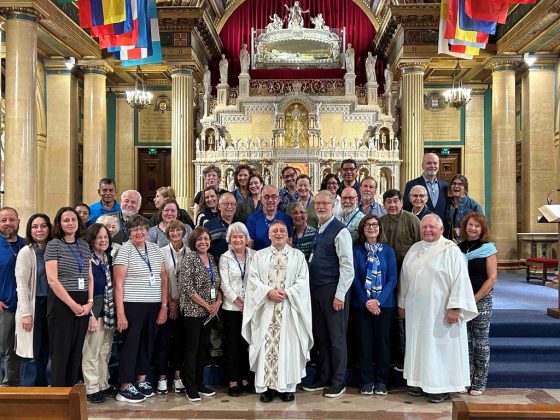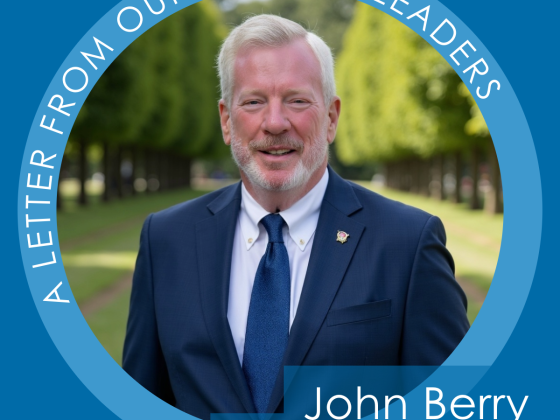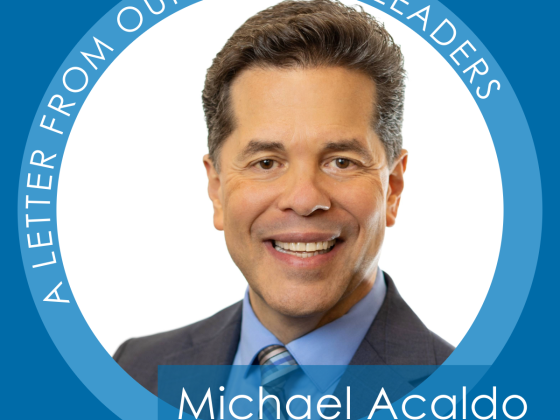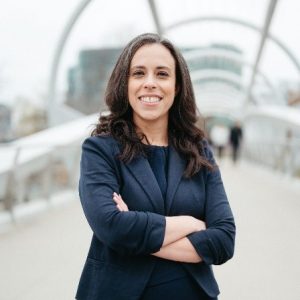
When Ingrid Delgado talks about her journey into advocacy, she often returns to the stories she grew up hearing around her family’s dinner table. Her parents, immigrants from Cuba, refused to denounce their Catholic faith, even when it meant her father became a political prisoner and her mother was barred from pursuing the studies she wanted.
Those early experiences planted the seeds for a vocation that has since taken Ingrid from missionary work in the Dominican Republic to roles with Catholic Charities, the Florida Conference of Catholic Bishops, and the U.S. Conference of Catholic Bishops. Today, she serves as the Society of St. Vincent de Paul’s first National Director of Public Policy and Advocacy, ensuring that the voices of Vincentians and the neighbors they serve are represented in Washington, D.C.
We spoke with Ingrid about her path to this role, the work of the D.C. office, and her hopes for the months ahead.
What drew you to advocacy work, particularly at the intersection of faith and public policy?
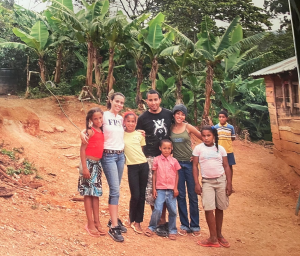
Ingrid and her husband serving as missionaries in the Dominican Republic.
As an adult, my husband and I served as missionaries in the Dominican Republic, near the Haiti border. We worked on projects that provided potable water, built houses and schools, and helped community members obtain birth certificates. When we began partnering with the government, I saw how much more effective our efforts became. That experience showed me, for the first time, how justice and charity can work together to benefit people in need.
I first learned about the Church’s role in public policy when I met my predecessor at the Florida Conference of Catholic Bishops while helping staff their table at a national event in Orlando. I remember thinking, “I want to do what she does when I grow up.” About a year later, she retired and encouraged me to apply for her position. I went on to serve eight years in public policy for the Florida bishops, followed by four years at the U.S. Conference of Catholic Bishops.
The D.C. office is still fairly new. Why was it important for the Society of St. Vincent de Paul (SVdP) to establish a presence here?
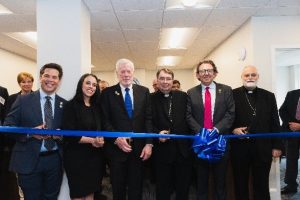
SVdP USA cutting the ribbon to its new national office in Washington, D.C.
Catholic Social Teaching calls us to walk on the “two feet” of justice and charity. Serving people in need through charitable works is essential to our identity, but Pope Benedict also spoke of “social charity,” engaging in policymaking to build up the common good and ensure no one is left on the margins. Washington, D.C. is the nation’s policy hub. Having a presence here allows SVdP to bring its unique perspective to the table which is informed by our deep roots in direct service. It’s how we can help shape policies that truly serve our brothers and sisters in need.
Can you describe your role as National Director of Public Policy and Advocacy?
A big part of my role is listening to Vincentians about what they’re seeing on the ground and the needs they encounter during home visits, and then translating those into policy solutions. Too often, policy is discussed at a theoretical or academic level without a clear connection to how it affects people’s lives. SVdP’s person-to-person service changes that. It gives us direct knowledge of the struggles people face and insight into solutions that work, whether to prevent homelessness or help someone out of poverty. For example, Vincentians have shared how hard it is to find affordable mental health care for the people they serve. That immediately raises a policy question: if Medicaid reimbursements for mental health care were higher, would there be more affordable providers available?
I also keep a close watch on Congress: what bills are moving, what’s being considered, who’s leading key committees, and where there’s potential to build relationships. From there, I analyze legislation through a Vincentian lens—asking questions like, “Will this help prevent homelessness?” or “Will it make housing less affordable?”—and make recommendations to our leadership on whether SVdP should weigh in.
Since the office opened, what are some key highlights or accomplishments you’re most proud of?
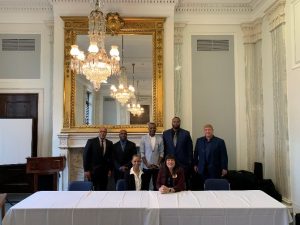
Panelists and moderators from the Hill briefing on faith-based approaches to re-entry.
One key accomplishment I’m especially proud of was when Steve Havemann, CEO of SVdP Des Moines, and Phil Conley, a mentor in the SVdP Des Moines Immersion Program, joined a Hill briefing we co-hosted with Catholic Charities USA, the National Religious Campaign Against Torture, and the Jesuit Conference Office of Justice and Ecology. They spoke with Hill staffers about the faith-based approach to incarceration and reentry. As Catholics, we believe in the capacity for human beings to reform and transform their lives, and when we center human dignity, we help people reenter society successfully, able to support themselves, their families, and avoid recidivism. It was a powerful and well-received event.
We also weighed in on the reconciliation bill, acknowledging some moderate improvements, but raising serious concerns about changes to SNAP and Medicaid and their impact on people who rely on these services. In addition, we’ve begun engaging on legislation that affects people in need, and we’ve joined Catholic partners in sending letters to Congress on the Farm Bill and appropriations. Even when legislation raises concerns, we look for opportunities to address them through upcoming bills and budget decisions.
As you look to the next several months, what are your top priorities for the D.C. office?
Over the summer, SVdP National Director of Poverty Programs Steve Uram and I hosted a Voice of the Poor webinar for Vincentians on making the most of the August work period, when members of Congress were back in their districts. We walked through how to request meetings, build relationships, and share stories from the community. I’m looking forward to hearing how those meetings went and how they might inform members’ work when they return to Washington.
Since returning to DC in September, members of Congress have been working on appropriations bills. We sent letters on the Agriculture and Transportation-HUD appropriations bills, urging robust funding for critical nutrition and housing programs.
We’re also working to strengthen our advocacy infrastructure. Over the summer, a Marquette University intern began creating a database to help us mobilize Vincentian volunteers more intentionally. My long-term goal is to capture SVdP’s impact by congressional district so that when we meet with members of Congress, we can show how many Vincentian volunteers are in their communities, what programs are available, and the local impact we’re making. This information not only positions us as a resource but also builds relationships rooted in our shared commitment to human dignity, not politics or partisanship. We hope to continue expanding this resource with the help of additional interns this fall.
How can Vincentians support SVdP’s advocacy work and get involved?
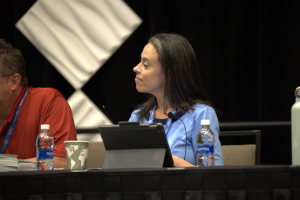
Ingrid presenting on a panel at the SVdP National Assembly 2025 in Louisville, Kentucky.
The easiest way to get involved is by signing up for our action alerts. You can do that through the “Members” section of our website under Voice of the Poor. When there’s important legislation to weigh in on, whether it’s encouraging support, opposing a bill, or offering a Vincentian perspective, those alerts make it simple. With just a few clicks, you can send a message directly to your elected officials.
Another valuable way to help is by sharing stories from your local community at stories@svdpusa.org. Vincentians can send us examples of needs, challenges, and successes from their service. Those stories are powerful tools in our advocacy, helping policymakers see the human impact behind the issues.
Advocacy can be challenging work, especially when we are living in an unprecedented political climate. What keeps you motivated and hopeful?
As people of faith, we’re called to be people of hope. In advocacy, that means remembering that no single bill is the end of the story. In my 12 years doing this work, including my time with the Catholic bishops, I’ve seen the political pendulum swing in both directions. Laws that were concerning have later been amended or repealed. There’s always another opportunity to engage, another bill to influence, another chance to make a difference.
If you could help people understand just one thing about SVdP’s advocacy, what would it be?
I’d want people to understand that SVdP’s advocacy is not partisan—nor should it be. In fact, we’re most effective when we remain nonpartisan, focusing solely on uplifting the needs of people we serve. Those needs transcend politics. Both parties have gotten some things right, and both have areas where they can do better. Our role is to build bridges across the political aisle, helping to heal some of the polarization we see today. We do that by bringing stories from our home visits directly to lawmakers, so they can create policies informed by real experiences. Legislators will make policy with or without us. How much better if those decisions are shaped by the Vincentian perspective and a commitment to the common good!
Do you have a favorite Scripture verse or Vincentian virtue that inspires your approach to public policy?
I’d say my favorite Vincentian virtue is humility. In public policy work, it can be easy to lose sight of that and start thinking we’re important because of our position or expertise. But as Catholics working for a faith-based organization alongside people in need, we have to remember that this is first and foremost about God, our faith, our calling, and serving our communities. Humility keeps the focus where it belongs.
Can you tell me a little about yourself outside of SVdP?
I was born in Miami, spent nearly 30 years in Orlando, and eight years in Tallahassee while working for the Florida Conference of Catholic Bishops. I used to say I’d never move farther north because this Cuban Floridian wasn’t made for cold weather, but when the opportunity to join the U.S. Conference of Catholic Bishops came along, I knew I had to take it. I’ve now called Virginia home for four years.
Outside of work, I’m a mom to three children and have been married for 25 years. As someone still relatively new to the D.C. area, I love spending weekends visiting museums, having picnics on the National Mall, and discovering new parts of the city.
I also serve on the board of the Catholic Mobilizing Network, continuing my long-standing commitment to ending the death penalty at both the state and federal level. In addition, I enjoy connecting with non-Catholic faith leaders, especially in the Latino evangelical community, who are eager to engage in public policy in a nonpartisan, faith-based way, much like the Catholic bishops do.

